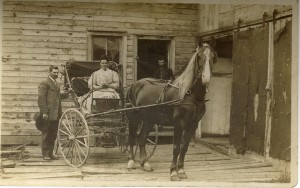 February 18, 2010
February 18, 2010
In 2002, Hisako Kakai published an article in the journal, Health Communication, about preferences for disclosure of a cancer diagnosis. Dr. Kakai indicates that in Japan, a direct communication style is usually preferred when it comes to disclosing one’s personal diagnosis of cancer. In other words, people want to be told they have cancer. However, an indirect communication style with no disclosure, or an ambiguous disclosure to the patient was preferred for a family member. The article raises many interesting communication and ethical issues.
A serious diagnosis raises the question, ‘how do we deal with uncertainty?’ Communication plays a big role. It points to the reality that we often are not good with dealing with uncertainty. We frame uncertainty as ‘bad’ and let uncertainty overtake everything good that might be going on in our lives. This relates to how we communicate about a serious health condition. It also relates to how we communicate about the economy, about security, and about an endless number of issues that equal being — human.
The message communicated often to us is, ‘work hard and it will pay off’ — with payoff crossing a spectrum from health, relationships, and wealth. The message, ‘life is uncertain. Work hard at your relationships and school and work, and take satisfaction in the fact that you worked hard’ — is communicated less often, if at all. And it shows up in our inability to deal with uncertainty, our obsession with …reducing the uncertainty.
Should the goal in communicating be to reduce uncertainty? When it comes to our health, that may not always be the best aim. If we can learn to manage the uncertainty of a diagnosis, we may be better able to live our lifes as someone living with cancer or heart disease or diabetes. If we make the diagnosis a more integral part of our being and identity, we may communicate in ways that define us to others as being disabled rather than living with a disability, diabetic rather than managing life while living with diabetes, and so on.
Even more surprising, when we focus on managing our uncertainty as a part of life, we may even discover that there are times when we communicate to increase uncertainty. Instead of being certain that our future, our health, our well-being are uncertain and that is a bad thing, we can use uncertainty as a way to promote hope. In our own research, Ben Cairns and I found that this was particularly important for people who have newly experienced spinal cord injuries and their family members. ‘Will she walk again? Will he be able to do things for himself? Can she sit up on her own? Can he feed himself?’ Not knowing offers people living with the injury and their families and friends the hope that they might do these things again.
Communicating to increase uncertainty about a diagnosis thus gives some time to adapt to a diagnosis. And that may be the best and more ethical way to communicate about an advanced cancer diagnosis as well. Not telling so that a patient does not know a true diagnosis may seem to offer a way to manage a serious diagnosis and thus to reduce uncertainty. Telling and acknowledging that the diagnosis is serious, even very serious, but that predicting exactly when the end-of-life will happen is uncertain may give some time to adapt to the diagnosis and some hope that important things that have not been said can be…
…a lesson in Dr. Maureen Keeley’s award-winning book, Final Conversations that has been shown to be so important for those who know that they are dying and the loved ones they will leave behind.

 February 8, 2010
February 8, 2010

 January 12, 2010
January 12, 2010 January 10, 2010
January 10, 2010